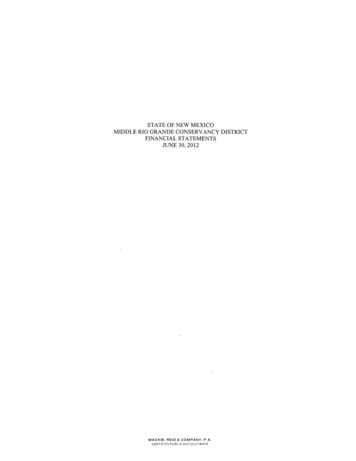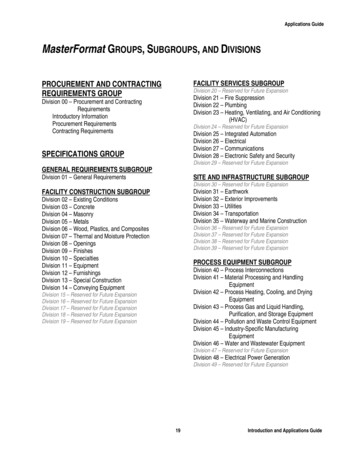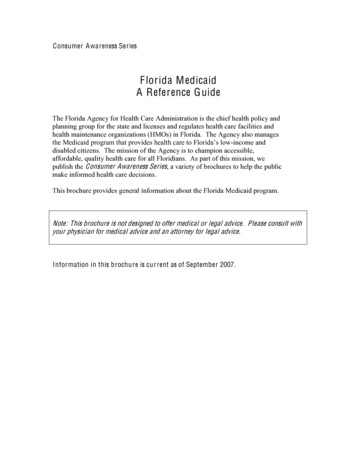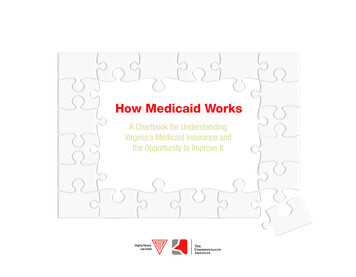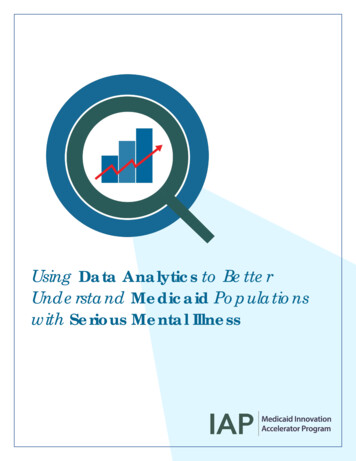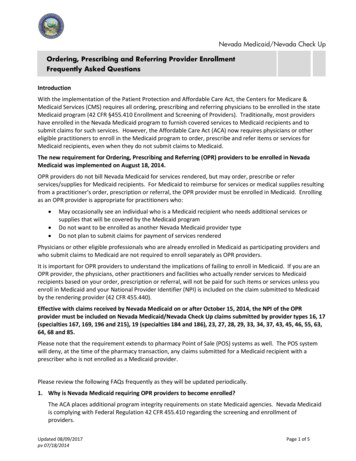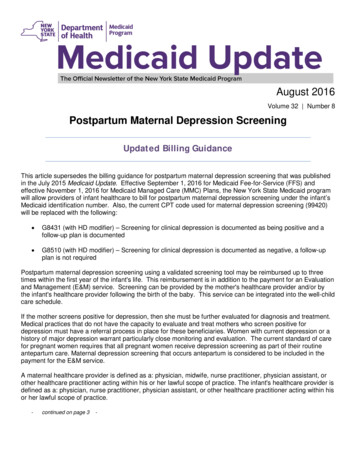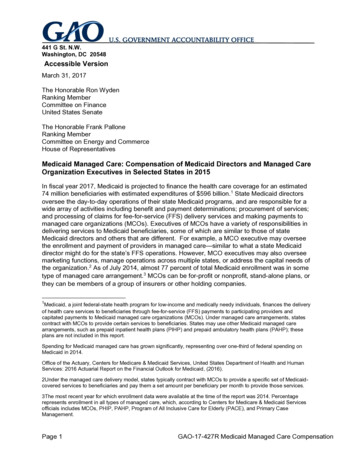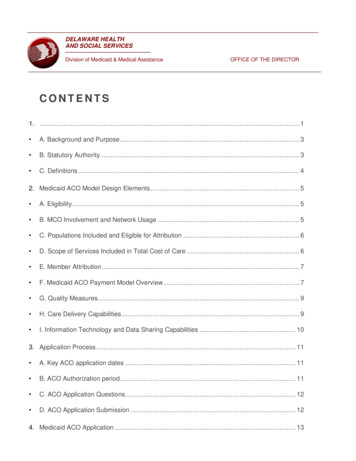
Transcription
DELAWARE HEALTHAND SOCIAL SERVICESDivision of Medicaid & Medical AssistanceOFFICE OF THE DIRECTORCONTENTS1. . 1 A. Background and Purpose . 3 B. Statutory Authority. 3 C. Definitions . 42. Medicaid ACO Model Design Elements . 5 A. Eligibility . 5 B. MCO Involvement and Network Usage . 5 C. Populations Included and Eligible for Attribution . 6 D. Scope of Services Included in Total Cost of Care . 6 E. Member Attribution . 7 F. Medicaid ACO Payment Model Overview . 7 G. Quality Measures . 9 H. Care Delivery Capabilities . 9 I. Information Technology and Data Sharing Capabilities . 103. Application Process . 11 A. Key ACO application dates . 11 B. ACO Authorization period. 11 C. ACO Application Questions . 12 D. ACO Application Submission . 124. Medicaid ACO Application . 13
A. Background Information . 13 B. Governance . 15 C. Financial Plan and Experience With Risk Sharing . 16 D. Care Delivery Model . 18 E. Quality Improvement . 21 F. Health Information Technology and Data Exchange: . 21 G. Assurances and Attestations . 23
INTRODUCTIONA. BACKGROUND AND PURPOSESix years ago, the Centers for Medicare & Medicaid Services (CMS) awarded the State of Delaware (Delawareor State) a State Innovation Model grant to achieve five state-defined objectives, one of which was to engagepayers to move health care payment to a pay-for-value model based on total cost of care (TCOC) budgeting.Since that time, and following considerable intensive stakeholder work, it has become apparent there are limitsto the scope and pace of progress through voluntary adoption of payment and delivery reform by payers andproviders. In states that have initiated or implemented reform, state government and stakeholders havecollaborated to create mechanisms that bolster and accelerate system transformation.In its 2017 Report to the Delaware General Assembly on Establishing a Health Care Benchmark, theDepartment of Health and Social Services (DHSS) identified five strategies to advance the adoption ofvalue-based purchasing (VBP) models, one of which was the implementation of TCOC alternative paymentmodels (APMs) within Medicaid managed care contracts and the State Employee Benefit Contracts. In 2018,DHSS increased its focus on promoting alternative payment strategies by adding VBP requirements toMedicaid managed care contracts. Furthermore, in 2019, DHSS released a request for information on thedesign and development of Medicaid accountable care organizations (ACOs) in Delaware.In 2020, the Division of Medicaid & Medical Assistance (DMMA), under the direction of DHSS, continued toadvance this work toward TCOC APMs by creating a Medicaid/Children’s Health Insurance Program (CHIP)Accountable Care Organization Program (Medicaid ACO Program) for the purpose of improving healthoutcomes while reducing costs through VBP arrangements which include downside financial risk forparticipating ACOs.ACOs are group arrangements in which health care practitioners (e.g., hospitals, physicians, other health careproviders) agree to assume responsibility for the quality, outcomes, and cost of health care for a designatedgroup of patients. Through VBP arrangements based on a TCOC calculation, ACOs are financially incentivizedto coordinate patient care across care settings, address behavioral health and social needs and improvepatient experience. DMMA seeks a Medicaid ACO Program with a strong foundation in supporting a robustprimary care system within the State.The Medicaid ACO Program allows qualified provider organizations to apply to become Medicaid ACOs andcontract with Medicaid managed care organizations (MCOs) in a TCOC arrangement. In September 2020,DMMA authorized four health care provider groups to serve as Medicaid ACOs and additional organizationsmay apply for Medicaid ACO authorization on an annual basis. DMMA believes that by working together,Medicaid ACOs and MCOs can better coordinate care for Delaware’s Medicaid and CHIP members, providingbetter health outcomes and lower costs.B. STATUTORY AUTHORITYThe Medicaid ACO Program is implemented pursuant to section 80000 of Division of Social Services Manual(DSSM), Authorization and Regulation of Medicaid/CHIP Accountable Care Organizations. Under the statutoryauthority of 42 CFR 438.6(c)(i) and 29 Del.C. § 7931, this regulation sets forth standards for the authorizationand regulation of ACOs for Medicaid/CHIP beneficiaries in Delaware to improve health outcomes whilereducing costs through VBP arrangements which include downside financial risk for participating ACOs.
C. DEFINITIONSACO: A group arrangement in which health care practitioners (e.g., hospitals, physicians, other health careproviders) agree to assume responsibility for the quality, outcomes and cost of health care for a designatedgroup of Medicaid and/or CHIP members.ACO Contract: A contract formed between an ACO and a Medicaid MCO, which includes payment via avalue-based arrangement as defined by DHSS. There will not be a direct contract between DMMA and theapplicant ACO as part of this initiative.ACO Requirements: Minimum standards and qualifications needed for an ACO to receive authorization fromDMMA to participate in the program as an approved Medicaid ACO. Receiving DMMA authorization does notguarantee a subsequent ACO contract from a Medicaid MCO.ACO Participant: A health care provider organization identified by a tax identification number (TIN) that hascontractual arrangements with the applicant ACO entity for the purposes of participating in a Medicaid TCOCmodel and coordinating care for members (e.g., hospitals, clinics, specialists, etc.).Applicant ACO: The health care provider, provider organization or other entity applying for ACO authorizationthrough DMMA.Behavioral Health: Health care services related to the diagnosis or treatment of mental illness, emotionaldisorders, or substance use disorders (SUDs) and the application of behavioral health principles to addresslifestyle and health risk issues.Governing Body: The board of directors or other entity responsible for formulating the policy and directing theaffairs of the Medicaid ACO.Medicaid ACO: An applicant ACO that receives DMMA authorization to participate in the Delaware MedicaidACO Program.Medicaid ACO Program: The Delaware Medicaid ACO Program described in this application.Medicaid MCO: The managed care entity that DMMA contracts with directly for the provision of Medicaid/CHIPservices. Currently, there are two Medicaid MCOs: AmeriHealth Caritas Delaware and Highmark HealthOptions.Participating Clinicians: A clinician (e.g., primary care provider [PCP], specialist, etc.) that contracts with or ispart of the applicant ACO for the Delaware Medicaid ACO Program.Participating Primary Care Provider (Participating PCP): A PCP that contracts with or is part of theapplicant ACO for the Delaware Medicaid ACO Program and is eligible for member attribution. To enableattribution, the respective participating PCP must be exclusive to the Medicaid ACO.PCP: PCPs may include Medical Doctors or Doctors of Osteopathy in the following specialties: internalmedicine, family medicine, general practice, pediatrics, and geriatric medicine. In addition to physicians noted,a PCP may also be a Certified Registered Nurse Practitioner or a Federally Qualified Health Center.Recognized Legal Entity: A legal entity (e.g., corporation, Limited Liability Corporation [LLC]) with a FederalTIN formed under applicable Delaware and Federal laws and authorized to conduct business in Delaware.
Related ACO Party: Entities other than the applicant ACO that either have a legal or financial responsibility forthe actions of the applicant ACO (e.g., parent organization, related parties).Social Determinants of Health (SDOH): Non-medical drivers of health outcomes, status, and costs, such ashousing and adequate nutrition.VBP: a model for provider reimbursement that promotes value over volume, such as a shared savings orrisk-based arrangement.MEDICAID ACO MODEL DESIGN ELEMENTSA. ELIGIBILITYMedicaid ACOs must be an approved legal entity in Delaware. Applicant ACOs may or may not be acredentialed Medicaid provider organization, but the ACO’s governance structure must have sufficient authorityto ensure the delivery of high quality, cost-effective care to Medicaid and CHIP members. The applicant ACOmust be able to enter into an ACO contract in accordance with the payment model as described in Section 2.F,including taking on downside risk within a TCOC arrangement. The applicant ACO must successfullydemonstrate the ability to coordinate the full scope of health care services included under the Medicaid ACOProgram for attributed members, as well as fulfill all other capabilities outlined in the application. The ACO’sgeographic service area does not need to be statewide.DMMA may modify Medicaid ACO Program guidance and/or requirements from time to time. Medicaid MCOsand Medicaid ACOs are expected to comply with program updates and all relevant federal and Stateregulations.Each contract between a Medicaid ACO and Medicaid MCO must involve a minimum of 5,000 Medicaid and/orCHIP attributed members. The applicant ACO must demonstrate how it will achieve and sustain this minimummember attribution level. Failure to sustain at least 5,000 attributed members in each contract with a MedicaidMCO may result in DMMA rescinding authorization to the ACO to participate in this program. Medicaid ACOsare expected to have a Compliance Plan in place that outlines the organization’s compliance with all applicablefederal and State laws and Delaware Medicaid ACO program requirements. The Compliance Plan shouldoutline ways of preventing, detecting and correcting noncompliance and must be made available to DMMAupon request.B. MCO INVOLVEMENT AND NETWORK USAGEMedicaid ACOs will enter into three-year TCOC agreements with Medicaid MCOs, provided that the MCOsmaintain their MCO contracts with DMMA for the term of the agreement, according to parameters in Section2.F. MCOs will be responsible for attributing members to ACOs through selection of or assignment to aparticipating PCP (see Section 2.E for details). Participating PCPs may only participate with one Medicaid ACO(this provision does not affect non-Medicaid ACO relationships that a PCP or provider organization mayconsider). Specialists may participate in multiple Medicaid ACOs. Members attributed to ACOs will be able touse any provider in the Medicaid MCO’s network as well as other providers as permitted under applicablefederal or State law (e.g., family planning services). All ACO participants and participating clinicians in an ACOmust be credentialed providers with the Delaware Medicaid program, as applicable.
C. POPULATIONS INCLUDED AND ELIGIBLE FOR ATTRIBUTIONAll Medicaid and CHIP managed care enrollees in the State will be eligible for attribution to Medicaid ACOswith the exception of the following populations: Medicare-Medicaid dual eligibles. Long-term care facility residents (e.g., nursing facility residents). Individuals receiving long-term services and supports (LTSS) through eligibility for enhanced DiamondState Health Plan (DSHP) Plus benefits, enrollment in the Promoting Optimal Mental Health for Individualsthrough Supports and Empowerment (PROMISE) program or Lifespan program.Please note that individuals receiving traditional Medicaid covered support services such as home health careor private duty nursing are not excluded from ACO attribution simply by virtue of receiving any “LTSS-like”benefit. The Medicaid fee-for-service (FFS) population will not be impacted by the Medicaid ACO program.D. SCOPE OF SERVICES INCLUDED IN TOTAL COST OF CAREThe Medicaid ACO TCOC calculations will include all medical, physical health, behavioral health, andpharmacy services included under the Medicaid MCO risk contracts for attributed members. The currentMedicaid MCO contract is comprehensive in that the Medicaid MCOs cover most Medicaid/CHIP services forenrolled members. Unless the individual is excluded from this ACO program, all services that are part of theMedicaid MCO risk contract will be included in the TCOC payment model including services such as homehealth care or private duty nursing, which may be considered LTSS for other purposes. Any service that is theresponsibility of the State and excluded from the Medicaid MCO risk contract (e.g., FFS carve-outs, non-riskarrangements) will not be included in the Medicaid ACO TCOC payment model. A current example is dentalbenefits.Any supplemental or additional care management, care coordination, or similar payments made from theMedicaid MCO to the Medicaid ACO or ACO participant will be included in the TCOC calculation. Separateperformance, quality, or outcome-based incentive payments made by the Medicaid MCO to the Medicaid ACOor ACO participant will not be included in the TCOC calculations.All of the attributed members’ care as provided in the TCOC calculation will be attributed to the Medicaid ACO,regardless of whether the Medicaid ACO delivered the services.
E. MEMBER ATTRIBUTIONMembers will be attributed to a Medicaid ACO prospectively based on:1. Member PCP selection.2. If the member does not select a PCP, MCO assignment to a PCP.If MCO assignment is used, the assignment methodology should consider the member’s utilization of primarycare services over the past 12–24 months. MCOs and ACOs have the flexibility to negotiate the specificattribution methodology within these guidelines, including frequency that attribution changes are made basedon PCP changes.F. MEDICAID ACO PAYMENT MODEL OVERVIEWThe Medicaid ACO Program will include two payment tracks, which are based on TCOC and outlined in Table1. Both payment tracks are intended to promote VBP and the deployment of more innovative APMs toproviders. Each track specifies the split of shared savings/risk between the Medicaid ACO, Medicaid MCO, andthe maximum savings/loss rate. Under Track 1, Medicaid ACOs will have upside-only risk the first year andtake on downside risk in program years two and three. Track 2 will allow Medicaid ACOs to take on downsiderisk beginning in program year one and shift from shared risk to a full-risk model by year three.For each ACO contract, DMMA expects the Medicaid ACO and Medicaid MCO to negotiate a contract in goodfaith incorporating Track 1 or Track 2. It is possible for a Medicaid ACO to have different payment tracks withdifferent MCOs (e.g., Track 1 with MCO #1, Track 2 with MCO #2). If an MCO is able to execute a MedicaidACO agreement with a DMMA approved Medicaid ACO that is more advanced and at least meets theminimum design parameters described below for Tracks 1 or 2, this may be acceptable to DMMA. By providingDMMA a copy of the MCO-ACO agreement, DMMA can review the payment terms to ensure it meets theminimum design parameters. DMMA reserves the right to review ACO contracts, including updates andamendments, upon request.
TABLE 1Year 1TRACK 1TRACK 2Upside-only shared savings.Shared savings and risk.50/50 shared savings split between the ACOand the MCO.*60/40 shared savings and risk split.*Shared savings and risk.Shared savings and risk.60/40 shared savings split, 25/75 shared risksplit.*75/25 shared savings and risk split.*Shared savings and risk.Full risk.60/40 shared savings split, 50/50 shared risksplit.*Maximum savings rate of 10% of capitation rate,downside risk capped at 10% of capitation rate.Maximum savings rate of 10% of TCOC target,Maximum savings rate of 10% of TCOC target. downside risk capped at 5% of TCOC target.Year 2Maximum savings rate of 10% of TCOC target,Maximum savings rate of 10% of TCOC target, downside risk capped at 10% of TCOC target.downside risk capped at 5% of TCOC target.Year 3Maximum savings rate of 10% of TCOC target,downside risk capped at 5% of TCOC target.*Shared savings and shared risk splits are listed as ACO/MCO. Shared savings percentage represents the maximum amount that canbe given to ACOs if the ACO gets a perfect quality score. The shared risk percentage is the minimum level of risk ACOs must beresponsible for, given a minimum quality score. ACOs and MCOs have the option to negotiate adjustable shared savings/riskpercentages based on quality performance within these boundaries. Specifically, the shared savings rate for ACOs may be lessened ifACOs do not meet negotiated quality targets. The shared risk percentage for ACOs may be lessened if ACOs meet negotiated qualitytargets.Payments to ACOs will be adjusted for quality/outcomes as described in Section 2.G. DMMA intends to giveflexibility to the Medicaid ACOs and Medicaid MCOs to negotiate specific payment design details within thebroad framework of this application. DMMA expects the details listed below will be articulated in anyACO/MCO contract; guidance for these aspects are listed below:i. Defining a TCOC TargetThe TCOC target must include the TCOC scope of services outlined above for all providers. The ACO/MCOwill determine the TCOC target and comparison group (e.g., historical performance of the ACO, minimumattainment, statewide average or other reasonable and appropriate means). The ACO contract must include anexpected growth trend to which the target value is expected to grow over time, which is reasonable,transparent and straightforward. The TCOC target and growth trend must be risk adjusted using a reputablerisk adjustment process. ACOs and MCOs are encouraged to factor SDOH into these adjustments.DMMA is encouraging, although not currently mandating, providers be paid using APMs that move away fromtraditional FFS. DMMA may, at a future point, specify a provider payment model for a given service or providertypeii. Truncation of Expenditures for TCOC CalculationsMedicaid ACO programs typically truncate costs for extremely high cost patients at a predetermined level.Truncating costs at a specific level is not required, but DMMA advises Medicaid ACOs and MCOs to considertruncating applicable member expenditures subject to TCOC calculations on a per member per year basisabove either the: (1) top 1% of member costs or (2) 250,000 in total covered expenditures.
iii. Minimum Savings RateDMMA recommends ACO contracts contain a minimum savings rate (MSR) appropriate for the number ofmembers served under the contract to ensure savings earned by the ACO, or losses incurred by the ACO, arethe result of actual care coordination efforts and not random variation. Such rates must be based on anactuarially sound computation. The MSR should only be intended to mitigate the effect of random variation andnot be used by either the Medicaid ACO or Medicaid MCO as a detriment to negotiating an ACO contract ingood faith. For example, a MSR of 2% may be reasonable, but a MSR of 10% is not.iv. Tying Payment to QualityContracts between Medicaid ACOs and MCOs must tie payment to quality using a methodology mutuallyagreeable. More information on quality measures is given in Section 2.G below.v. Financial Viability to Accept Downside RiskThe ACO must be able to demonstrate financial viability to accept downside financial risk in its contract with itsMedicaid MCO partner(s). For Track 2 ACO arrangements, the arrangement must be made as part of the initialACO/MCO contract, while Track 1 ACOs will need to demonstrate financial viability by year two of an ACOcontract. These arrangements will be subject to agreement by the contracting ACO and MCO. Financialviability may be ensured through a number of different means, including, but not limited to, a performancebond, financial risk certificate, stop loss insurance, cash reserves, or another risk mitigation strategy.G. QUALITY MEASURESACO payment will be tied to a limited set of meaningful, quality measures. DMMA intends to provide flexibilityin the quality measures that can be used and how performance is evaluated. In the future, DMMA may chooseto more specifically define which quality measures must be used and how the measures are used to impactpayment. To reduce the reporting burden on ACO participants, the quality measures selected for ACOcontracts must closely align with other quality measures sets used in Delaware, such as the qualityperformance measures in DMMA’s Medicaid MCO agreements, statewide quality benchmark measures,Delaware Common Scorecard measures, and Healthcare Effectiveness Data and Information Set (HEDIS)measures. DMMA expects the quality measures used in the Medicaid ACO payment model to be appropriatefor the applicable ACO member population and, where practical, to leverage the same quality measurescurrently used for other Medicaid programs.The ACO/MCO contract’s payment model must be tied to performance on the quality measure set in ameaningful way. In a track that involves shared savings/losses, the amount of savings/losses should reflectquality performance; in the case of a capitation rate, a quality withhold should be implemented. DMMA expectsthe relationship between payment and quality be designed so the Medicaid ACO earns a greater share ofsavings if it performs well on quality measures, and less or nothing at all if the Medicaid ACO performs poorly.In an arrangement with shared losses, losses may be reduced if quality performance is high.H. CARE DELIVERY CAPABILITIESMedicaid ACOs must be able to effectively deliver coordinated, cross-continuum care and have a plan in placeto do so for their attributed Medicaid population. This includes building on a strong primary care foundation todeploy care coordination capabilities across primary care services, specialty care services, and the ability toprovide access, either directly or through affiliations/contractual relationships, to behavioral health care, acutecare, maternal and perinatal care, community and social support, long-term care, and oral-health care. TheMedicaid ACO should also have a plan in place to measure, monitor, report, and improve quality and healthequity. This plan must include consumer engagement strategies and approaches for identifying and
understanding the needs of attributed Medicaid populations as well as addressing population health, includingmember behavioral health and SDOH. At this time, DMMA will not require specific care delivery models to beimplemented as part of the Medicaid ACO program, but the ACOs must have a plan in place to effectively andefficiently deliver and coordinate necessary services with their partner Medicaid MCO. The ability of theMedicaid ACO to effectively and efficiently collaborate and coordinate with the Medicaid MCO(s) regardingmember care will impact how successful the ACO will be in subsequently obtaining and maintaining an ACOcontract.Medicaid ACOs will be required to coordinate care management responsibilities with the Medicaid MCOs, butthe ACOs will not be required to submit this strategy to the State for approval. However, since there is thepotential for duplication of care coordination activities and limited integration, it is expected that Medicaid ACOsand MCOs should clearly delineate their roles. DMMA intends to monitor this going forward to ensure programefficiency and modify the design of the Medicaid ACO program as needed.I. INFORMATION TECHNOLOGY AND DATA SHARING CAPABILITIESThe Medicaid ACOs’ ability to effectively and efficiently accept, analyze, exchange, meaningfully use, andreport on data to the Medicaid MCOs, ACO participants, and participating PCPs will be a key factor insubsequently obtaining and maintaining an ACO contract. Through this Medicaid ACO initiative, DMMA isseeking to leverage advances in information management and use them to improve health care quality andoutcomes and positively impact the level of health care expenditures. To that end, Medicaid ACOs mustdemonstrate their information technology and data sharing capabilities, including the following parameters: Widespread adoption of a common electronic health record (EHR) or interoperable EHRs across theMedicaid ACO. The ability to report accurate quality and other data to Medicaid MCOs on a timely basis. The capability to effectively manage risk-based contracts, including being able to receive and analyzequality and cost data on a timely basis. Effectively use and securely exchange actionable data with ACO participants and participating clinicians toimprove outcomes and reduce unnecessary costs. Comply with applicable federal or State laws and regulations regarding handling, storage and exchange ofhealth information (e.g., The Health Insurance Portability and Accountability Act [HIPAA] compliance).The Medicaid MCOs and ACOs have the flexibility to negotiate processes for timely, complete, and accuratequality measure data submission as well as the format and level of detail of data sharing. Additionally,Medicaid ACOs are encouraged, but not required, to exchange admissions, discharge and transfers (ADT)data with the Delaware Health Information Network (DHIN).
APPLICATION PROCESSOrganizations interested in becoming Medicaid ACOs are invited to submit the application in Section 4 belowfor consideration by DMMA. While this is not a competitive application process, DMMA may not approve allACO applicants and may request additional information as part of the application review process. Applicationswill be accepted during an annual application period, and approved Medicaid ACOs would enter into contractswith MCOs effective January 1 of the following year.A. KEY ACO APPLICATION DATESThe Medicaid ACO application period for participation in the Medicaid MCO contract period starting on January1, 2022 will run from March 1, 2021 to April 23, 2021. Key dates in this application process are shown in thetable below:TABLE 2: KEY DATES FOR 2021 MEDICAID ACO AUTHORIZATION CYCLE2021 MEDICAID ACO CYCLE KEY EVENTSKEY DATESACO application releasedMarch 1, 2021Questions on application dueMarch 12, 2021 by 1:00 pm ETResponses to questionsApproximately March 26, 2021ACO applications dueApril 23, 2021 by 1:00 pm ETApproved ACOs announced/ACO authorization period commences By June 30, 2021ACO/MCO contract start dateJanuary 1, 2022ACO/MCO contract end date1December 31, 2024ACO authorization end date (if not renewed)December 31, 20241 Subjectto MCO continuing to have an MCO agreement with DMMA.B. ACO AUTHORIZATION PERIODACOs will be authorized for a period of three complete calendar years beginning on the date the application isauthorized by DMMA through the end of the subsequent third full calendar year. For example, if an ACO’sapplication is approved by DMMA by June 30, 2021, approval will commence on that day through December31, 2024. If ACO application criteria change, previously authorized ACOs may be required to submit additionalinformation to comply with these new requirements.Authorization is not a guarantee of a contract with a Medicaid MCO nor a guarantee of ACO cost or qualityperformance. Similarly, Medicaid ACO authorization by DMMA does not require authorized Medicaid ACOs toenter into contracts with a Medicaid MCO. While Medicaid MCOs may be incentivized by DMMA to enter intocontracts with Medicaid ACOs, all ACO contracts must be negotiated and agreed to by the Medicaid ACOs andMedicaid MCOs. DMMA reserves the right to review ACO contracts, including updates and amendments, uponrequest. Subject to an MCO continuing to have an MCO contract with DMMA, the ACO contracts must be threeyears in length beginning on January 1. Contracts between MCOs a
patient experience. DMMA seeks a Medicaid ACO Program with a strong foundation in supporting a robust primary care system within the State. The Medicaid ACO Program allows qualified provider organizations to apply to become Medicaid ACOs and contract with Medicaid managed care organizations (MCOs) in a TCOC arrangement. In September 2020,
